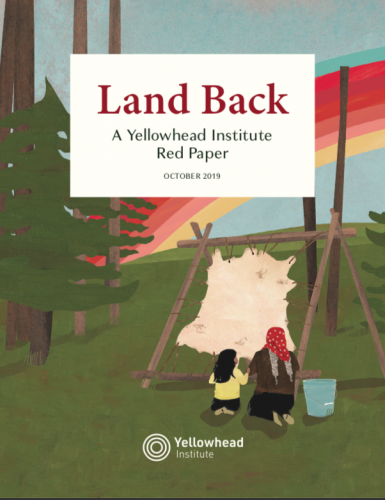One of the loudest and most frequent demands of Indigenous people in the relationship with settlers is for the return of the land.
There are mountains of evidence that describe the theft of Indigenous territories, and even more mountains that testify to the harms that followed and the need for restoration.
Despite this, in the supposed era of reconciliation there can appear to be progress: legal “victories,” proliferating negotiation tables, land codes development, impact benefit agreements, and so on. For some, these may be enough. But for others, particularly those asserting rights and jurisdiction outside of reserve or settlement boundaries, they do not go far enough.
That is because there is a stubborn insistence by Canada, the provinces and territories, that they own the land. For many Indigenous communities, this is a deep violation of their consent to determine what happens on unsurrendered lands, but also a violation of the broader assertion that they have jurisdiction over those lands.
This is the focus of Yellowhead Institute’s first Red Paper. It considers in very specific detail the existing land and resource strategies of federal and provincial governments, with reference to their interface of Indigenous law and Aboriginal rights and title. The Paper asks a number of broad questions:
- WHAT REGIMES of consent have been practiced by Canada, if any, and what does land restitution look like for First Nations in the context of these regimes?
- HOW DO THE Crown and industry dispossess Indigenous peoples of land and waters today?
- WHY ARE THE CROWN’S current consent regimes failing to protect Indigenous interests in the land?
- HOW CAN INDIGENOUS PEOPLE re-assert jurisdiction to lands and waters outside of reserve boundaries?
- WHAT MODELS of Indigenous governance centre community-based decisions on land/water use and cultural resurgence?
This analysis finds that there are three approaches to consent being practiced in Canada toward Indigenous jurisdiction and they fall along a spectrum of denial, recognition, and reclamation. Each of these approaches, described in greater depth below, provide the framework of this report:
PART ONE: SPECTRUM OF CONSENT
A framework to understand how Indigenous consent is ignored, coerced, negotiated, or enforced.
PART TWO: DENIAL
The strategies deployed to dispossess Indigenous people of the land.
PART THREE: RECOGNITION
The limited land management rights offered to Indigenous peoples by the Crown and industry.
PART FOUR: RECLAMATION
Community-based strategies of consent-based jurisdiction.
CONCLUSION: THE CONTINUATION OF LIFE
An argument for why Indigenous jurisdiction matters in the midst of an ongoing climate crisis.
Land theft is currently driven by an unsustainable, undemocratic, and fatal rush toward mass extinction through extraction, development, and capitalist imperatives. It is further enabled by a racist erasure of Indigenous law and jurisdiction. As Yellowhead Research Fellow Sákéj Henderson has noted, this fatal rush functions as a kind of malware released into our ecological system. Indigenous legal orders embody critical knowledge that can relink society to a healthy balance within the natural world. This change must begin on the ground: Canada ceding real jurisdiction to Indigenous peoples for this transformation to happen. With or without
Canadians, Indigenous people will continue to exercise it because responsibility demands it.
Discover more tools and resources
Table fo Contents
PREFACE
EXECUTIVE SUMMARY
PART ONE: The Spectrum of Consent
- Architectures of Theft
- The Emergence of Consultation
- An Indigenous Consent Framework
PART TWO: Denial
- The Problem of “Crown Land”
- Resource Nation
- Injunctions & the Police
- Cumulative Impact
- Conclusion
PART THREE: Recognition
- Impact and Benefit Agreements
- Government Resource Revenue Sharing
- Environmental Regulation
- Ownership & Equity Stakes
- Conclusion
PART FOUR: Reclamation
- Environmental Assessment & Monitoring
- Tsleil-Waututh and the Trans Mountain Expansion Pipeline
- Stk’emlúpsemc te Secwépemc Nation Ajax Mine Assessment
- Heiltsuk and the Indigenous Marine Response Centre
- Mi’gwawei Mawiomi Secretariat and the Chaleur Terminals
- Consent Protocols and Permitting
- Neskantaga’s Development Protocol
- Sakgeeng Consent Protocol
- Saugeen Ojibway Nation and Nuclear Waste
- Tŝilhqot’in Mushroom Permits
- Re-Occupying the Land
- Secwepemc Tiny House Warriors
- Uni’stot’en Healing Centre
- Nimkii Aazhibikong Sylvia McAdam & Sakaw Askiy Management Inc.
- Implementing Indigenous Models of FPIC: Considerations
CONCLUSION: The Continuation of Life
SOURCE: The Yellowhead Insititute





